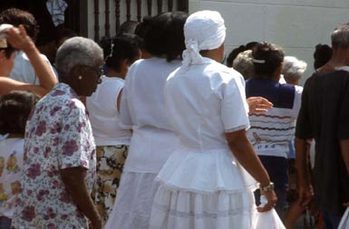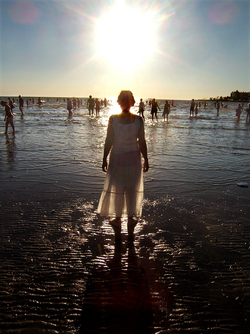Initiation Into Santería

A newly initiated priestess goes visiting with her godmother.
Not all people who practice Santería have been initiated into the religion. In Cuba, for example, most people, regardless of race, are familiar with some aspects of the religion and may occasionally seek out a Santero (priest) or Santera (priestess) for a consultation when they face a particular problem. People who have no formal ties to the religion are called Aleyos, which technically means "outsiders" or "strangers." This term, however, covers a vast gamut of people. Some may know absolutely nothing about the religion and have no interest in it. Others may occasionally ask for a consulta or help of some kind, but whether or not they really believe in the religion is an open question. Some approach the consulta out of desperation, or out of curiosity. Over time, they may or may not become more deeply involved with the religion. There are "aleyos religiosos" (religious aleyos), however, who have made a more formal commitment to the religion by establishing a connection to a religious elder and an ile (temple-house). These people have undergone some ceremonies, such as the reception of the warriors or the beaded necklaces called "elekes,"but they're not yet fully initiated. In the United States, some people refer to these "aleyos religiosos" as "aborishas, to distinguish them from aleyos who have never received anything in the religion. An Oloricha is a fully initiated Priest or Priestess, commonly known as a Santero or Santera. To become a Santero or Santera, the Orichas have to signal through oracular divination that the individual is being called to the religion. A relatively small percentage of Lucumí practitioners are fully initiated Olorichas, as this step represents a serious and full time commitment to the spiritual practices of Regla de Ocha, as well as a special calling.
Why Practice Santería?

Communion with the Natural World
Harmony and equilibrium, both on the individual and societal levels, are very important concepts in the Regla de Ocha religion. A person who maintains good inner balance lives in harmony with nature and other human beings and, as a result, tends to experience more iré, or blessings. When the person lacks inner balance or experiences conflict with the world around him, he is said to suffer from osorbo, or negative energy, which manifests as obstacles, bad health, antagonistic relationships, failure, economic ruin, or another kind of problem. In order to bring himself back into balance, he can consult a Lucumí priest or priestess who, through an oracular process of divination, communicates with the Orichas, or spirits, to find out what the problem is and how to fix it. This process, generally known as a consulta (consultation) or registro (examination), isn't fortune telling, as some outsiders mistakenly believe. It's a sacred ceremony combined with prayers and petitions to the Orichas, asking for intervention and divine help. The Regla de Ocha teaches us that we, as living creatures, are made up of the same spiritual energy that exists in the world around us and links us to the divine. Through the intervention of the Orichas on our behalf, we can find our true path in life and live in a more authentic and productive way, resulting in a better life in the here and now. The consulta, or divination practice, is used to diagnose the physical, emotional, spiritual and mental state of the person who comes seeking help.
